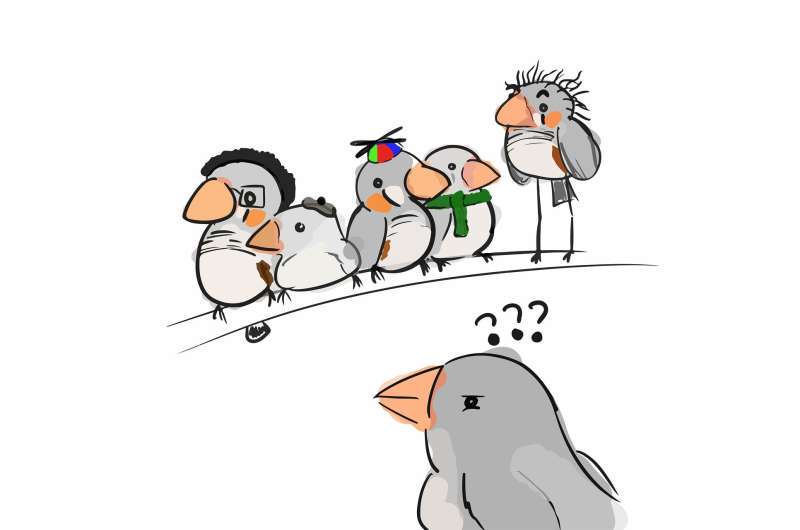Cartoon of zebra finch attempting to recognize an individual. Credit: Kevin Yu
A trio of researchers at the University of California has found that zebra finches are able to remember up to 42 bird voices based only on their vocalizations. In their paper published in the journal Science Advances, K. Yu, W. E. Wood and F. E. Theunissen describe experiments they conducted with captive zebra finches and what they learned about their memory abilities.
Prior research has shown that humans have what is known as "fast mapping"—the ability to recognize an association between things after very little exposure—recognizing someone's voice after a single conversation, for example. Prior research has suggested that fast mapping might be uniquely human. In this new effort, the researchers in California conducted experiments with zebra finches that challenge that notion.
The experiments involved first training test finches on small sets of call data and then expanding them to test the birds' limits. To that end, the first day of training involved playing either a call or a distant song for a given bird—vocalizations were parsed, with one set leading to a food reward and another that did not. The result was a test that allowed a bird to demonstrate whether or not it recognized a bird making a given call. Over time, the number of bird calls was increased. If the bird recognized a pre-recorded call, they could allow it to play out, leading to a food reward. If they did not recognize a call, they could peck a button to skip to the next call. Via the training, the researchers found that the finches were able to remember and recognize on average 42 birds by their vocalizations alone.
Example of distance calls. Credit: Theunissen Lab at UC Berkeley
In all, the researchers trained and tested 19 finches and found that all of them were able to discriminate between birds by their calls and remember large numbers of them. The researchers noted that the birds learned to recognize other birds by their calls very quickly—all it took was a few exposures. They also found that the birds retained their memories of the other birds over time, as well—a month later, they were all still able to recognize the birds by the calls that they had been trained to recognize. The researchers suggest that their experiments indicate that zebra finches have fast mapping skills.
Example of songs. Credit: Theunissen Lab at UC Berkeley
More information: K. Yu et al. High-capacity auditory memory for vocal communication in a social songbird, Science Advances (2020). DOI: 10.1126/sciadv.abe0440
Journal information: Science Advances
© 2020 Science X Network
























